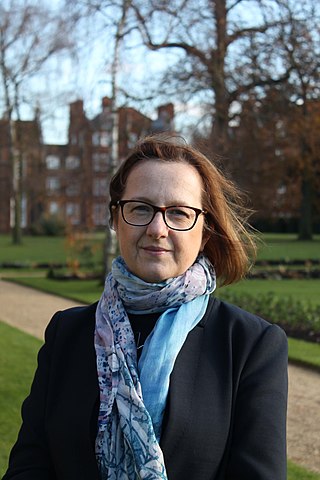Computational linguistics is an interdisciplinary field concerned with the computational modelling of natural language, as well as the study of appropriate computational approaches to linguistic questions. In general, computational linguistics draws upon linguistics, computer science, artificial intelligence, mathematics, logic, philosophy, cognitive science, cognitive psychology, psycholinguistics, anthropology and neuroscience, among others.

Avram Noam Chomsky is an American public intellectual known for his work in linguistics, political activism, and social criticism. Sometimes called "the father of modern linguistics", Chomsky is also a major figure in analytic philosophy and one of the founders of the field of cognitive science. He is a laureate professor of linguistics at the University of Arizona and an institute professor emeritus at the Massachusetts Institute of Technology (MIT), and is the author of more than 150 books on topics such as linguistics, war, and politics. Ideologically, he aligns with anarcho-syndicalism and libertarian socialism.
Theoretical linguistics is a term in linguistics which, like the related term general linguistics, can be understood in different ways. Both can be taken as a reference to theory of language, or the branch of linguistics which inquires into the nature of language and seeks to answer fundamental questions as to what language is, or what the common ground of all languages is. The goal of theoretical linguistics can also be the construction of a general theoretical framework for the description of language.
The Arts and Humanities Citation Index (AHCI), also known as Arts and Humanities Search, is a citation index, with abstracting and indexing for more than 1,700 arts and humanities academic journals, and coverage of disciplines that includes social and natural science journals. Part of this database is derived from Current Contents records. Furthermore, the print counterpart is Current Contents.
Cognitive grammar is a cognitive approach to language developed by Ronald Langacker, which hypothesizes that grammar, semantics, and lexicon exist on a continuum instead of as separate processes altogether. This approach to language was one of the first projects of cognitive linguistics. In this system, grammar is not a formal system operating independently of meaning. Rather, grammar is itself meaningful and inextricable from semantics.

Stephen Roy Albert Neale is a British philosopher and specialist in the philosophy of language who has written extensively about meaning, information, interpretation, and communication, and more generally about issues at the intersection of philosophy and linguistics. Neale is a Distinguished Professor of Philosophy and Linguistics and holder of the John H. Kornblith Family Chair in the Philosophy of Science and Values at the Graduate Center, City University of New York (CUNY).

The term Cartesian linguistics was coined by Noam Chomsky in his book Cartesian Linguistics: A Chapter in the History of Rationalist Thought (1966). The adjective "Cartesian" pertains to René Descartes, a prominent 17th-century philosopher. As well as Descartes, Chomsky surveys other examples of rationalist thought in 17th-century linguistics, in particular the Port-Royal Grammar (1660), which foreshadows some of his own ideas concerning universal grammar.

The University of Hawaiʻi Press is a university press that is part of the University of Hawaiʻi.
Geoffrey Sampson is Professor of Natural Language Computing in the Department of Informatics, University of Sussex. He produces annotation standards for compiling corpora (databases) of ordinary usage of the English language. His work has been applied in automatic language-understanding software, and in writing-skills training. He has also analysed Ronald Coase's "theory of the firm" and the economic and political implications of e-business.
Donkey sentences are sentences that contain a pronoun with clear meaning but whose syntactical role in the sentence poses challenges to grammarians. Such sentences defy straightforward attempts to generate their formal language equivalents. The difficulty is with understanding how English speakers parse such sentences.
Zeno Vendler was an American philosopher of language, and a founding member and former director of the Department of Philosophy at the University of Calgary. His work on lexical aspect, quantifiers, and nominalization has been influential in the field of linguistics.

The Lolo-Burmese languages of Burma and Southern China form a coherent branch of the Sino-Tibetan family.
Linguistics is the scientific study of human language. It entails the comprehensive, systematic, objective, and precise analysis of all aspects of language — cognitive, social, environmental, biological as well as structural.

Katarzyna Malgorzata "Kasia" Jaszczolt is a Polish and British linguist and philosopher. She is currently Professor of Linguistics and Philosophy of Language at the University of Cambridge, and Professorial Fellow at Newnham College, Cambridge.
Acta Linguistica Academica is a quarterly peer-reviewed academic journal published by Akadémiai Kiadó. It covers research on all aspects of linguistics, including socio- and psycholinguistics, neurolinguistics, discourse analysis, the philosophy of language, language typology, and formal semantics. It was formerly published as Acta Linguistica Hungarica and Acta Linguistica Academiae Scientiarum Hungaricae, obtaining its current name in 2017. The editor-in-chief is András Cser. The journal was established in 1951.
The philosophy of linguistics is the philosophy of science applied to linguistics. It is concerned with topics including what the subject matter and theoretical goals of linguistics are, what forms linguistic theories should take, and what counts as data in linguistic research. This distinguishes the philosophy of linguistics from the philosophy of language, which deals primarily with the philosophical study of meaning and reference.
Barbara Kenyon Abbott is an American linguist. She earned her PhD in linguistics in 1976 at the University of California at Berkeley under the supervision of George Lakoff. From 1976 to 2006, she was a professor in the department of linguistics and Germanic, Slavic, Asian, and African languages at Michigan State University, with a joint appointment in philosophy. She is now a Professor Emerita.

Lourdes Ortega is a Spanish-born American linguist. She is currently a professor of applied linguistics at Georgetown University. Her research focuses on second language acquisition and second language writing. She is noted for her work on second language acquisition and for recommending that syntactic complexity needs to be measured multidimensionally.
Theory of language is a topic from philosophy of language and theoretical linguistics. It has the goal of answering the questions "What is language?"; "Why do languages have the properties they have?"; or "What is the origin of language?".
Alice Geraldine Baltina ter Meulen is a Dutch linguist, logician, and philosopher of language whose research topics include genericity in linguistics, intensional logic, generalized quantifiers, discourse representation theory, and the linguistic representation of time. She is a professor emerita at the University of Geneva.







